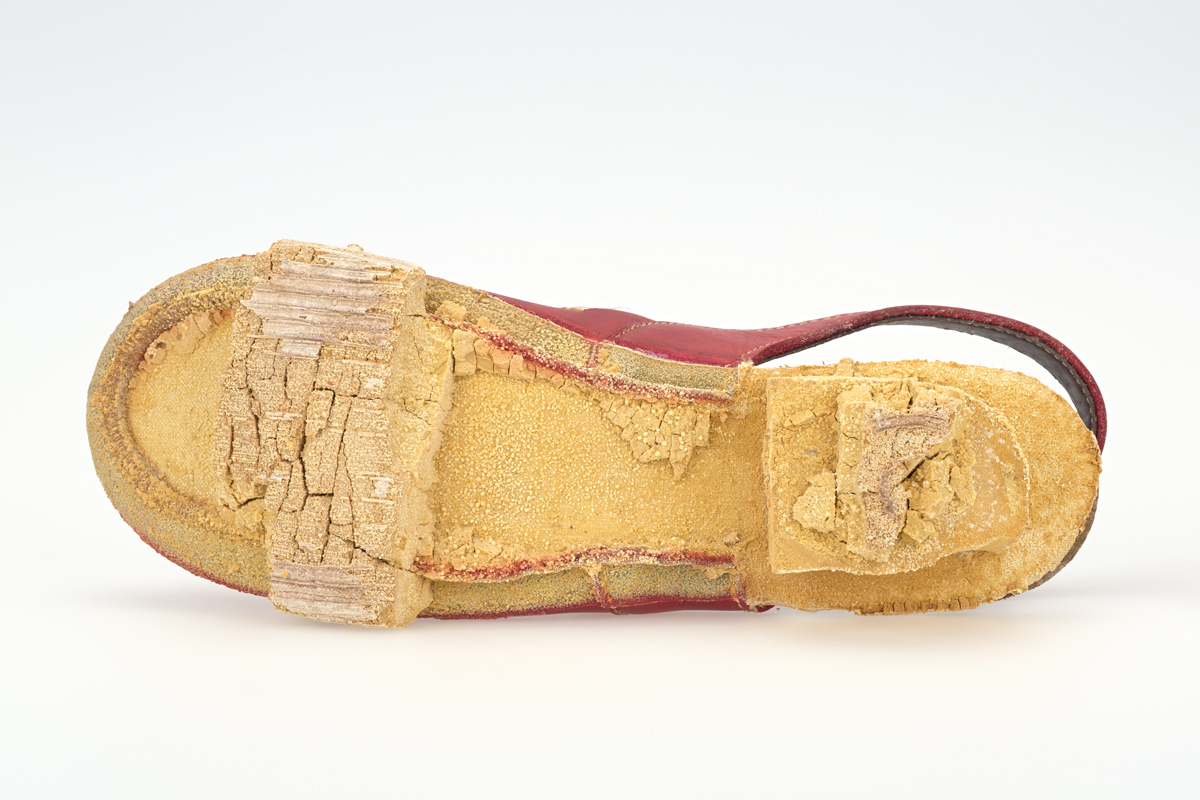Thursday, 12 September 2019
A historic shoe collection has been saved from possible destruction thanks to work undertaken by scientists at the University of Nottingham.
Curators at the Alfred Gillett Trust, a charitable organisation that manages a collection of heritage footwear, were concerned by changes occurring in items within their care, which featured polyurethane soles. Like many synthetic plastic materials, the changing composition of these objects over extended periods of time has contributed to physical deterioration, leaving soles sticky, whilst raising concerns they might now contain hazardous chemicals.
Tim Crumplin, Business Archivist at the Alfred Gillet Trust said: “The Trust holds around 25,000 shoes in its heritage collection,dating from Roman fragments to contemporary items. We enlisted the voluntary services of a retired polymer chemist to investigate the implications of this degradation. The ensuing literature study revealed that 4,4’-diaminodiphenylmethane (4,4’-MDA, for short) might conceivably be generated by a process of interaction between the polyurethane and atmospheric moisture - called hydrolysis. No in-depth research was found that confirmed such material would produce 4,4’-MDA over time, but it was appreciated 4,4’-MDA is classified as a substance of very high concern in Europe and a carcinogen in the USA. Owing to the possible risks of 4,4’-MDA we were keen to obtain solid evidence to confirm its presence, or otherwise, to enable us to make informed decisions on suitable protection measures, working practices, and to conserve and exhibit items safely or enact the controlled destruction of the footwear affected.”
To find out if the soles contained 4,4’-MDA at levels sufficient enough to cause concern, the Trust called upon the expertise of the University of Nottingham’s Business Partnership Unitin the School of Chemistry. They developed a chemical analysis method to detect 4,4’-MDA down to an industrially accepted concentration: none was found at this level in the soles analysed. By careful and detailed cooperation, a series of experiments was also devised to indicate whether 4,4’-MDA could be formed in the future.
This innovative approach to analysis of heritage collection artefcats has now been published in Heritage Science.
Solving scientific problems
Using a chemical analysis technique called Liquid Chromatography Mass Spectrometry (LC-MS) scientists analysed the polyurethane soles selected by Alfred Gillett Trust spanning 1970 – 1999. This LC-MS process separates the individual components of the sample so that each can be identified. No 4,4’-MDA was detected at the lowest detection limit using the developed method.
This project is a great example of how we can help organisations and businesses solve scientific problems. Working together we were able to meet the needs of the client using our state-of-the-art equipment and the results we produced have allowed the Alfred Gillett Trust to decide how best to proceed with their preservation activities. Importantly this unusual and important project demonstrates how broad chemistry challenges are interwoven into our everyday lives and how BPU can assist organisations of all types, no matter how extraordinary the analytical challenge at hand may be.

Tim continues: “We are delighted with the outcome of this project, with how commercially aware the University of Nottingham were, and how professionally the project was run and managed from start to finish.”
Story credits
Images © Alfred Gillett Trust / C & J Clark Ltd.
More information on the is available from www.nottingham.ac.uk/chemistry-bpu, George Marshall on George.marshall@nottingham.ac.uk+44 (0)115 84 68078 or Jane Icke Media Relations Manager for the Faculty of Science at the University of Nottingham, on +44 (0)115 951 5751 jane.icke@nottingham.ac.uk
Notes to editors:
About the University of Nottingham
Ranked 97 in the world and 17th in the UK by the QS World University Rankings, the University of Nottingham is a founding member of Russell Group of research-intensive universities. Studying at the University of Nottingham is a life-changing experience, and we pride ourselves on unlocking the potential of our students. We have a pioneering spirit, expressed in the vision of our founder Sir Jesse Boot, which has seen us lead the way in establishing campuses in China and Malaysia - part of a globally connected network of education, research and industrial engagement.
Nottingham was crowned Sports University of the Year by The Times and Sunday Times Good University Guide 2024 – the third time it has been given the honour since 2018 – and by the Daily Mail University Guide 2024.
The university is among the best universities in the UK for the strength of our research, positioned seventh for research power in the UK according to REF 2021. The birthplace of discoveries such as MRI and ibuprofen, our innovations transform lives and tackle global problems such as sustainable food supplies, ending modern slavery, developing greener transport, and reducing reliance on fossil fuels.
The university is a major employer and industry partner - locally and globally - and our graduates are the third most targeted by the UK's top employers, according to The Graduate Market in 2024 report by High Fliers Research. Alongside Nottingham Trent University, we lead the Universities for Nottingham initiative, a pioneering collaboration between the city’s two world-class institutions to improve levels of prosperity, opportunity, sustainability, health and wellbeing for residents in the city and region we are proud to call home. More news…